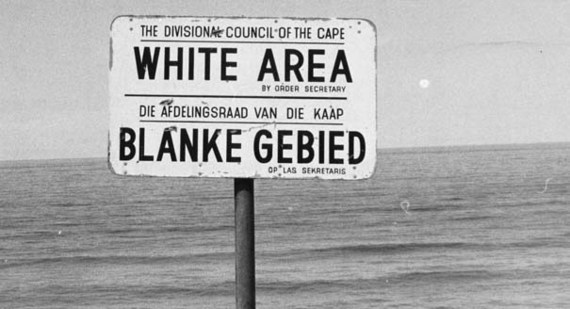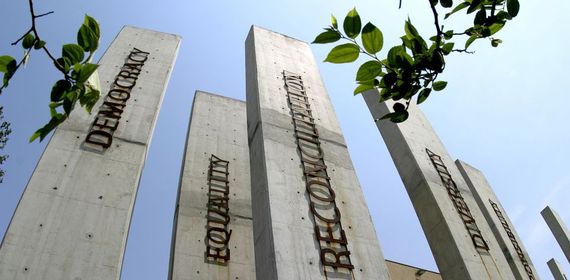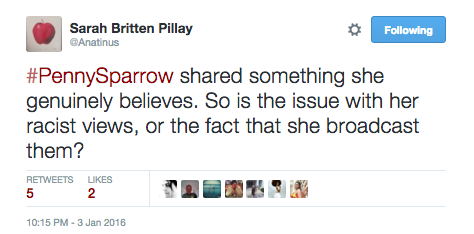For those of us who spent 2015 somewhere other than under a rock, among the flurry of many topics that took centre stage, was racism. The issues, sometimes framed in the more readily digestible tone of "conversations on race relations," related to what seemed to be a groundswell of understanding that racism wasn't - like unexpected hail on a pleasant sunny day or a mosquito bite in an unreachable part - something that can be tolerated because it too shall pass.
In 2015, voices of discontent grew louder recognising that complacency and apathy will not end racism.
In South Africa, picking up quite neatly from where 2015 left off, 2016 has already upped the ante. To put it quite simply: People are fed up.
Of course, it's far too early to call, but if the first few days of 2016 are anything to go by, more and more people have found their voices and are using them to address racism through jokes, jabs and justice. From #TheYearWeMispronounceBack to informing employers of the racism spewed by their employees (Happy New Year, Chris Hart) to submitting complaints to the South African Human Rights Commission detailing discrimination to laying criminal charges.
Intriguingly, the prevailing discourse remains one of treating racism almost solely as incidents - often with people pointing out that these are "isolated." Its worth repeating that racism isn't an occasional unwanted annoyance. Racism isn't a seasonal "ailment." Racism is everywhere, everyday. If anything, the fact that a year can kick off with so many such "incidents" is in itself quite telling.
Racism is a systemic and structural scourge gnawing at the very core of society.
It is this system of racism that allows many people to feel comfortable to openly (even if around the fire at a barbecue among "friends.") express their deeply prejudicial and discriminatory views. This system, quite unfortunately, empowers racists to carry on, knowing that little, if anything will happen to them.
Concerted efforts through various mediums, including on social media, have seen some people who have publicly expressed their racism lose their jobs and left humiliated. Several of these often find themselves issuing lightly glazed faux apologies to the offended.
But will an unemployed racist a day keep the racism at bay? Likely not. As media maven Gugulethu Mhlungu points out, "It's an indictment of how little we value black people that the worst consequence of racism is maybe losing a job." This is not to say that these efforts and their results are not to be commended. Indeed, when a person knows that their actions will have consequences - financial ones included - they might (and this is a big might) change their ways.
However, societies won't be rid of racism by just targetting those few racists who, against their better judgment (not that racists have much of that, in any event), publicise their racism on public platforms. The reality is these vocal racists are the low-hanging fruit of a society in which racism remains endemic. They would have fallen sooner or later -- or perhaps moved to Orania or if they are a fairly powerful politician and member of parliament sanctioned ZAR20 000 (US$ 1290) fine for their "sins."
In a society where racism is rejected and/or properly addressed, the Chris Harts, Penny Sparrows (who, in the spirit of #TheYearWeMispronounceBack, I occasionally call Shilling Smallbird), Justin van Vuurens, Dianne Kohler-Barnards, Dennis Dyasons, Edwin La Fontaines, Carron Nadauld Gouwses, Carel Boshoffs etc would find little room to express views reflective and/or supportive of the apartheid era.
These people and the "incidents" that make them infamous then take centre stage and in many ways, however unfortunate, distract society from the central issue with racism:
It is systemic.
If the very structure and system of racism is not done away with, for each racist humiliated and jobless, a rallying troupe emerges. And of course the many who are wiser than Shilling Smallbird will remain gainfully employed and the life of apartheid commemorative private events because they can; because their racism isn't just individualised, it is also societal. Their racism is endorsed by family and friends who either laugh at the monkey impressions or say nothing. Put simply: If the conditions remain conducive to racism, racism will prevail.
Racism is so pervasive that even the "well-meaners" like South African writer and blogger Sarah Britten-Pillay find little wrong with publicly asking people if their outrage at racist remarks is because of the racism or because the racism was made public.
The system of racism allows Swim4life Cape Town to get away with racism because a school with "10% black children" is representative aaaand apparently doing better than most of its kind.
It is impossible to keep track of every time someone says or does something racist because of racism's systemic and structural nature.
In seeking to dismantle racism, it is imperative to first acknowledge that these manifestations of racism don't happen just because of a few social miscreants. They occur because the environment of racism nurtured and still promoted by a culture rooted in apartheid didn't end with the casting of ballots.
Most importantly, and quite pragmatically, it is important to accept that the work of ridding society of racism is no easy task and requires all people on deck. On this and other issues bedevilling our society, lets hope 2016 is a year of decisive action.
It's too early to tell, but it does look promising...
[I am hopeful, but maybe 31 December 2016 will not roll by to muted sighs of "Plus ça change, plus c'est la même chose "?]


